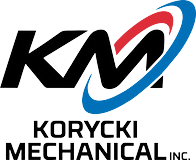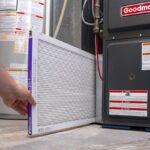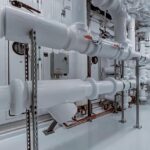While some HVAC problems may be resolved by just cleaning the coils and filters, many of the 8 most typical heating and cooling system faults can worsen if not addressed right away.
By calling for regular preventative maintenance, most of these may be prevented. To avoid outages during severe weather, it is advisable to get your system tested once a year.
Below are some of the causes of HVAC breakdowns.
- Inadequate maintenance
To keep your system operating effectively, routine maintenance by a qualified service contractor is a MUST. With regular maintenance performed by a licensed service provider, many of the most frequent furnace problems may be avoided.
Your home heating system will likely cost you several thousand dollars. Then why not safeguard that investment? If you don’t undertake routine maintenance, you’ll probably encounter expensive problems that aren’t expected, higher energy costs, inferior performance, and dissatisfaction.
By contacting Korycki Mechanical Inc to have a certified professional evaluate your HVAC system right away, you can safeguard your investment and enjoy peace of mind.
- Dirty filters
Regularly changing your filter is one of the most important things you can do to lengthen the lifespan and performance of your furnace. Your unit will have to work considerably harder to circulate air around your home if your filter is filthy since it will limit ventilation.
This causes the blower in your furnace to work harder than necessary and will also have an adverse effect on comfort. The furnace may overheat and shut off on high limit due to a filthy filter.
- Ignition or pilot problems
Numerous factors can contribute to ignition issues. A filthy pilot, flame sensor, or burners may result in a pilot failure, short cycling, a locked-out furnace, or delayed burner activation.
The hot surface ignitor or thermocouple may need to be replaced due to wear and tear, or it may simply be the consequence of a gas supply issue. In either case, it is advisable to have a skilled service specialist tackle these issues because they include potentially harmful substances like high voltage and natural gas.
- Thermostat failures
There are several programmable and non-programmable thermostats available. When a homeowner thinks their furnace isn’t working correctly, the thermostat or how it’s set is frequently to blame.
You might save money by consulting your owner’s handbook and reading the operating instructions before making a purchase. Batteries in programmable thermostats may need to be changed on a regular basis.
A service professional can swiftly identify issues if they are still present.
- Either tripped breakers or blown fuses
The blower is overworking, which is the most frequent cause of a circuit breaker trip in a furnace. Your blower will need to work harder to make up for any obstructions that are preventing airflow to your system.
An air filter that is unclean is the main culprit. Your blower needs to work harder to push air through the filter when it is filthy. This makes the blower use more energy and occasionally trips the circuit breaker.
Before resetting your circuit breaker, inspect your filter and swap it out for a clean one. If the issue persists, it is essential to get in touch with an expert who can safely evaluate if the issue is brought on by a furnace issue or whether the circuit breaker may have broken down.
Duct leaks, closed or clogged air registers, or unclean coils are other problems that might cause the blower to overwork.
- The blower continues to run
Several factors might cause a blower to operate continually. Check the fan switch on the thermostat before making a service call. When the thermostat is at the fan-on setting, the motor will run nonstop.
Homeowners frequently unintentionally turn on the fan switch. When a call for heat is received, a fan relay in the furnace activates the blower; if the relay jams, the blower won’t switch off.
The system has a variety of safety features and restrictions. The circuit board may turn on the furnace to cool it down if it is engaged. The blower won’t turn off if the safety or limit doesn’t reset.
An experienced service expert can assess this issue and present possible solutions.
- Dirty evaporator or condenser coils
It’s likely that your air conditioner’s routine maintenance has gone unattended, which is why it isn’t cooling as well as it should. Your system’s coils can get clogged with dirt and debris, which can greatly diminish its effectiveness and cause it to age more quickly.
After turning off the condenser’s electricity, you can hose down the outdoor coil. At the electrical disconnect located close to the condenser or at the electrical panel, power can be turned off.
If the furnace filters are not replaced often, the inside evaporator coil may get unclean. Your furnace and air conditioner might operate less efficiently and more laboriously if your evaporator coil is unclean.
A certified professional will be required to clean very unclean coils.
- Furnace noises
A mechanical issue may be indicated by some furnace sounds, which are a typical aspect of functioning. An inducer motor or blower motor may begin to shriek or moan as the bearings begin to degrade.
In order to prevent a furnace failure, the motor might need to be replaced. Otherwise, we may install a brand-new furnace. Other sounds might be brought on by filthy burners or problems with ventilation.
In either case, it is advisable to pay attention to these warning indications since they can indicate a risky operating situation or even a furnace failure.
Your home’s comfort and happiness depend heavily on your HVAC system. But, like every system, it has certain typical problems. Your home’s heating, ventilation, and air conditioning system has a lot of moving parts, making it crucial to do regular maintenance on it because it controls the home’s environment.
Little problems call for the expertise of a qualified technician, while others may be solved by you with some research and hard work.
For more information on any of these common problems or any other HVAC questions you may have, contact the experts at Korycki Mechanical Inc.




